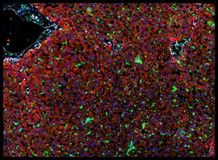
Research
Our research is aimed at understanding metastasis, the process through which cancer spreads beyond the primary tumor to distant organs. One of our first major discoveries was that primary tumors secrete factors, including cytokines, chemokines and small extracellular vesicles (sEVs, also, known as exosomes) that circulate to distant sites of future metastasis, establishing a specific microenvironment known as the pre-metastatic niche (PMN). We were also the first to show that extracellular vesicles and particles (EVPs) impact all aspects of the pre-metastatic niche, promoting vascular leakiness, immunosuppression and the recruitment of pro-metastatic and pro-angiogenic bone marrow progenitor cells, thus creating a favorable microenvironment for the survival of tumor cells prior to their arrival. We have defined the content or ‘cargo’ of tumor extracellular vesicles and particles, which are comprised of proteins, lipids, RNA and DNA, and studied their contribution to metastatic disease progression and re-programming the stromal and immune components of the pre-metastatic niche. We showed that specific tumor extracellular vesicle and particle cargo, such as integrins, helps direct the homing of tumors to future metastatic niches a discovery which furthers our understanding of metastatic tropism and identifies potential therapeutic targets to hinder metastasis. In addition, we are actively studying how tumor cells selectively package their distinct cargo. We have also adapted a new technology, asymmetric-flow field-flow fractionation, to isolate extracellular vesicle subpopulations and discovered a novel, very abundant particle, which we named the exomere. We employ sophisticated proteomic and bioinformatic approaches to identify EVPs cargo that can serve as biomarkers for early cancer detection, or to predict cancer progression, metastasis and response to therapy. We also have an active interest in EV-based theranostics.
Figure 1: Electron micrograph of extracellular vesicles and particles.

Figure 2: Multi-parameter imaging mass cytometry of the liver pre-metastatic niche in pancreatic cancer.

Figure 3: dSTORM super resolution microscopy imaging of a single cancer-cell derived extracellular vesicle (yellow, Cell Mask Green lipophilic dye; cyan, anti-CD81 and pink, anti-dsDNA antibodies).

Current Projects:
- Systemic effects of cancer
- Extracellular vesicle and particle cargo and biogenesis
- Extracellular vesicles and particles as cancer biomarkers
- Novel technologies for extracellular vesicle and particle characterization
Bio
Dr. Lyden completed his M.D at Brown University, Ph.D at the University of Vermont, residency in Pediatrics at Duke University, and fellowship at Memorial Sloan Kettering Cancer Center. He is the Stavros S. Niarchos Professor of Pediatrics and Cell and Developmental Biology at Weill Cornell Medicine in New York City. Early work in his laboratory resulted in several fundamental discoveries demonstrating that bone marrow-derived endothelial and hematopoietic progenitors participate in new blood vessel formation in primary tumors. Dr. Lyden showed that factors secreted by the primary tumor prime certain tissues for tumor cell engraftment. He defined the concept of the "pre-metastatic niche" (PMN), where newly recruited bone marrow-derived myeloid progenitor cells collaborate with tissue parenchyma resident cells to provide a platform for metastatic lesion assembly. Dr. Lyden then demonstrated that tumor-derived extracellular vesicles and particles initiate the PMN and are responsible for the systemic effects of cancer.
Selected Publications:
Kaplan RN, Riba RD, Zacharoulis S, Bramley AH, Vincent L, Costa C, MacDonald DD, Jin DK, Shifo K, Kerns SA, Zhu Z, Hicklin D, Wu Y, Port JL, Altorki N, Port ER, Ruggero D, Shmelkov SV, Jensen KK, Rafii S, Lyden D (2005) VEGFR1-positive haematopoietic bone marrow progenitors initiate the pre-metastatic niche. Nature 438 (7069): 820-827. PMID: 16341007
https://www.ncbi.nlm.nih.gov/pmc/articles/PMC2945882/
Hoshino A, Costa-Silva B, Shen T., Rodrigues G, Hashimoto A, Mark M.T, Molina H, Kohsaka S, Di Giannatale A, Ceder S, Singh S, Williams C, Soplop N, Uryu K, Pharmer L, King T, Bojmar L, Davies A.E, Ararso Y, Zhang T, Zhang H, Hernandez J, Kure E.H, Mallya K, Batra S.K, Vinagolu R.K, Fodstad O, Muller V, Pantel K, Bissell M.J, Ghajar C.M, Garcia B.A, Kang, Y, Matei IR, Peinado H, Bromberg JF, Lyden D (2015) Tumor exosome integrins determine organotropic metastasis. Nature 527(7578): 329- 335, PMID: 26524530.
https://pubmed.ncbi.nlm.nih.gov/26524530/
Hoshino A, Kim HS, Bojmar L, Gyan KE, …, Matei I, Jarnagin WR, Lyden D (2020) Extracellular Vesicle and Particle Biomarkers Define Multiple Human Cancers. Cell Aug 20;182(4):1044-1061.e18, PMID: 32795414. PMCID: PMC7522766.
https://pubmed.ncbi.nlm.nih.gov/32795414/
Wang G, Li J, Bojmar L, Chen H, Li Z, Tobias GC, Hu M, Homan EA, Lucotti S, Zhao F, Posada V, Oxley PR, Cioffi M, Kim HS, Wang H, Lauritzen P, Boudreau N, Shi Z, Burd CE, Zippin JH, Lo JC, Pitt GS, Hernandez J, Zambirinis CP, Hollingsworth MA, Grandgenett PM, Jain M, Batra SK, DiMaio DJ, Grem JL, Klute KA, Trippett TM, Egeblad M, Paul D, Bromberg J, Kelsen D, Rajasekhar VK, Healey JH, Matei IR, Jarnagin WR, Schwartz RE, Zhang H, Lyden D. Tumour extracellular vesicles and particles induce liver metabolic dysfunction. Nature. 2023 Jun;618(7964):374-382. Epub 2023 May 24. PMID: 37225988. [Highlights in Nature Reviews Cancer, Cancer Discovery, European Association for Cancer Research].
https://pubmed.ncbi.nlm.nih.gov/37225988/
Bojmar L, Zambirinis CP, Hernandez J, Chakraborty J, Shaashua L, Kim J, Ennu Johnson K, Hanna S, Askan G, Burman J, Ravishandran H, Zheng J, Jolissaint JJ, Srouji R, Song Y, Chobey A, Sang Kim H, Cioffi M, van Beck E, Sigel C, Jessurun J, Valasco Riestra P, Blomstrand H, Jonsson C, Jonsson A, Lauritzen P, Buehring W, Ararso Y, Hernandez D, Vinagolu-Baur J, Friedman M, Glidden C, Firmenich L, Lieberman G, Mejia DL, Nasar N, Mutvei AP, Paurl DM, Bram Y, Costa-Silva B, Basturk O, Boudreau N, Zhang H, Matei I, Hoshin A, Kelsen DP, Sagi I, Scherz A, Scherz-Shouval R, Yarden Y, Oren M, Egeblad M, Lewis JS, Keshari K, Grandgenett PM, Hollingsworth MA, Rajasekhar VK, Healy JH, Bjornsson B, Simeone DM, Tuveson D, Iacobuzio-Donahue CA, Bromberg J, Vincent CT, O’Reilly EM, DeMatteo RP, Balachandran V, D’Angelica ML, Kingham TP, Allen PJ, Simpson AL, Elemento O, Sandstrom P, Schwartz R, Jarnagin WR, Lyden D. A multiparametric atlas of the pre-metastatic liver predicts metastatic outcome in patients with early-stage pancreatic cancer. Nature Medicine, 2024. Jun 28. doi: 10.1038/s41591-024-03075-7. PMID: 38942992
https://pubmed.ncbi.nlm.nih.gov/38942992/
